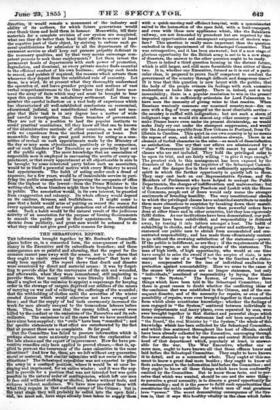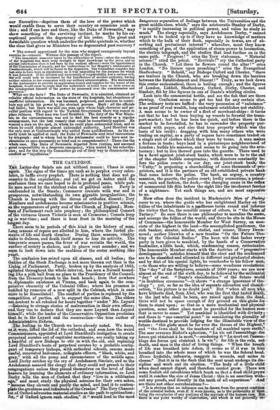THE SEBASTOPOL REPORT.
Tire information brought together by Mr. Roebuck's Committee places before us, in a connected form, the consequences of ineffi- ciency in the Executive and its subordinate branches ; and these consequences are so painful and alarming, that the regret for the occasion cannot pass away with the season, nor is the alarm that they ought to excite removed by the "remedies" that have al- ready been applied. The report shows that death and disaster were occasioned by direct and material causes : it was by forget- ting to provide ships for the conveyance of the sick and wounded, and afterwards, when they were remembered, still neglecting to provide them, that many soldiers were literally killed'; that so small a neglect as the omission to appoint a supercargo flir keeping order in the stowage of cargoes deprived' our soldiers of the means of carrying on war and of relieving the sufferinge of the wounded; that the withholding of clothes until the severities of the winter created disease which would otherwise not have ravaged our force ; and that the supply of bad tools enormously increased the work for men already unequal to the tremendous labours before them. Thus, for one man that the enemy killed, several were killed by the conduct or the omissions of the Executive and its sub- ordinates. The omissions in all the cases that we have mentioned have since been supplied ; the " evils " have been " remedied " ; and the specific statements to that effect are corroborated by the fact that at present there are no complaints. So far good.
But the Committee has failed to procure information which is perhaps almost more anxiously required than the explanation of the late abuses and the report olimprovement. How far have pre- ventive remedies only been applied to proved abuses,—that is, ap- plied to prevent the recurrence of the same calamities in the same situations? And how far, then, are we left without any guarantee, moral or material, that similar calamities will not occur in similar situations ? The Sebastopol expedition was not expected to place the army in a confined position, where it would be at once be- sieging and imprisoned, for an entire winter ; and it was the neg- lect to provide for a position that was not intended but was quite possible in the natural order of contingencies, which left our men to face cold without clothing or shelter, labour without tools, and sickness without medicines. We have now provided them with what they require in that confined corner of the Crimea ; but in the next stage they will probably be called into the open field ; and, we must ask, have steps already been taken to supply them
with a quick-moving and efficient hospital, with a commissariat suited to the locomotion of the open field, with a laud-transport, and even with those new appliances which, like the Balaklava railway, are not demanded by precedent but are required by the improved opportunities and consequent exigencies of modern war- fare ? This question is really more important than the question embodied in the appointment of the Sebastopol Committee. That was retrospective, and it has been answered ; but if a new stage of glorious opportunity for the British army is not to be a new stage of disasters, the answer to the other question ought to be ready. There is indeed a third question looming in the distant future, which is still larger, and still more formidable than either of these two. It is, whether our Executive, formed as it is out of a parti- cular class, is prepared to prove itself competent to conduct the government of the country through difficult and dangerouetimes? It is true that this question is now latent with the public; that the body of the people evinces its feelings with such excessive moderation as looks like apathy. There is; indeed; not a total insensibility; there is a popular resolution to win• in• the present struggle, and it is sufficiently artioulate fur Lord Palmerston to have seen the necessity of giving voice to that resolve. When Russians wantonly massacre our unarmed countrymen—fire on men with a flag of truce engaged on the most charitable service— the country is ruffled with indignation; but not such a storm of indignant rage as would stir almost any other oountry—as would make France heave even under its preaent dictatorship, as would make Italy cry out under the strongest suppression, and would stir the American.republic from New Orleans to Portland, from Ca- lifornia to Carolina. This quiet in our own country is by no means the repose of ease, and it will not continue always. There is an element of turbid character in the calm—as much of dissatisfaction as satisfaction. The cry that our allhim are administered by a " class " Government is listened to with assent by most of the classes who are not included. They hold the privileged order to be upon its trial, and are fairly willing " to give it rope enough." The greatest risk to this management has been exposed by the disasters of the East and the inquiries of the Sebastopol Commit- tee ; and' the danger lies in their• not sufficiently appreciating the spirit in which the further opportunity is quietly left to them. They may cast back on our Representative System, and the Members of Parliament who have helped to corrupt the Public Departments, the oharges'of indifferentism and malversation-; but if the Executive-were- to-play Peachem and Lookit with the House of COmmons, people out of doors would only nurse the stronger sentimentsrof brooding hostility. The very constitutional checks to which theTrivileged classes have submitted contribute to render them more obnoxious to suspicion by breaking down their morale. They may less flagrantly violate laws than powerful orders have done at other times and in other countries, but they less vigorously fulfil duties. As our institutions have been democratized, our pub- lic- offices have been subdivided, and responsibility is frittered away, by tearing it into tatters amongst a host. The habit of submitting to checks, and of sharing power and authority, has ac- customed our public men to shrink from accumulated and con- centrated responsibility, and has made them effeminately content to go without the crowning satisfaction of the statesman—power. lithe public is indifferent, so are they ; if the requirements of the public are vague, so are the enjoyments of the statesman. The man of high birth, of high opportunity, who would at one time have sought to seize the sword if not the sceptre of state, is now content to be one of a " board "—to be the fraction of a states- man ; compensated for the loss of individual exaltation by protection against accountability. Here we oome to the cause of the causes why statesmen are no longer statesmen, but only " individuals," assoilzied of responsibility by laying the blame upon, " the System." The System, of course, knew those things which have been told to the Sebastopol Committee ; but there is great reason to doubt whether the conflicting ideas of the confusion that was established in the Crimea, and of the con- sequent disaster, and of the necessity for repairs, or even of the possibility of repairs, were ever brought together in that connected form which alone constitutes knowledge; whether the feelings of men engaged in "the System," scattered between individuals in many departments and many places, even separated by seas, were ever brought together in that distinct and powerful shape which forms conscience. If the statesman had not been superseded by " the Board," the real Minister by " the System," the whole of this knowledge which has been collected by the Sebastopol Committee, and which lies scattered throughout the host of officials, should have been already collected by the Executive, converging through the lower channels up to the supreme and central Minister at the head of that department which, popularly at least, is answer- able for the war. The War Executive, whether one or more men, ought to have known all that those officers knew and laid before the Sebastopol Committee. They ought to have known it in detail, and as a connected whole. They ought at this, mo- ment to know a great deal more besides ; they ought to know all facts subsequent to the information laid before the Committee ; and they ought to know all those things which have been confessedly omitted by the Committee. But to know these facts, and to per ceive that which was wanted, should be one and the same thing : to perceive a great necessity, is to discern a grand opportunity for statesmanship ; and it is the power to fulfil such opportunities that constitutes the noble ambition for which men of real greatness love "power." The worst demoralizing consequence of the Sys- tem is, that it saps this healthy vitality in the class which forms our Executive—deprives them of the love of the power which would enable them to serve their country on occasions such as this ; and if one here and there, like the Duke of Newcastle," may show something of the surviving instinct, he marks by his ex- oeptional position the degeneracy of his order. The great and formidable question which underlies the public quietude is, whether the class that gives us Ministers has so degenerated past recovery ?
• The reward apportioned for the man who stepped courageously beyond routine is—censure. Witness this passage of the report. The immediate measures taken by the authorities at home—when the condition of the hospitals was more truly brought to their knowledge by the- press and by private information than it had been by the medical officers—were the appointment of the Commission of inquiry, and the instructions to her Majesty's Ambassador at Constantinople, which will be found in the Appendix.. The Committee consider this last step to have been as injudicious as it was unavailing for the purpose for which it was intended. If the division and uncertainty dresponsibility was a serious evil, the- cell could only be increased by the interference of another authority, having neither relation to nor connexion with our military administration. The instruction to the Ambassador to provide on application money and supplies for the wants of the hospitals, would seem to imply thitThe authentic, at home were as little aware as the commandant himself of the power' he possessed over the commissaries and purveyors." -What are the facts ? The Duke of Newcastle, it is admitted, obtained no reliable official information on the state of the hospitals, but abundance of unofficial information. He was harassed, perplexed, and anxious to contri- bute any aid in his power, by the shortest process. Mark : all. the officials had failed ; but there Mit' still one man upon whose high character and pe- culiar position with regard 'to the 'Turkish. Government there was reason to pike reliance. That man was Lord Stratford. The duty of the War Minis- ter, in the circumstances, was not to find the best remedy as a regular arrangement, but the best remedy that could be immediately applied. He wasted a man on the spot, in whom he could place, unbounded trust, and to whom he could delegate almost unbounded authority. Lord Stratford was the only man at Constantinople who united these qualifications. As the re- ined* Inuit be applied at once, the Duke of Newcastle sent brief instructions by telegraph : and to whom but to the Ambassador could he have sent in- stallations at once necessarily so brief and so comprehensive ? There lies the whole case. The Duke of Newcastle departed from routine, and assumed great responsibility in a desperate emergency, when misled by his subordin- atek ; and for this step the Committee go out of their way to characterize his conduct as " injudicious."



































 Previous page
Previous page